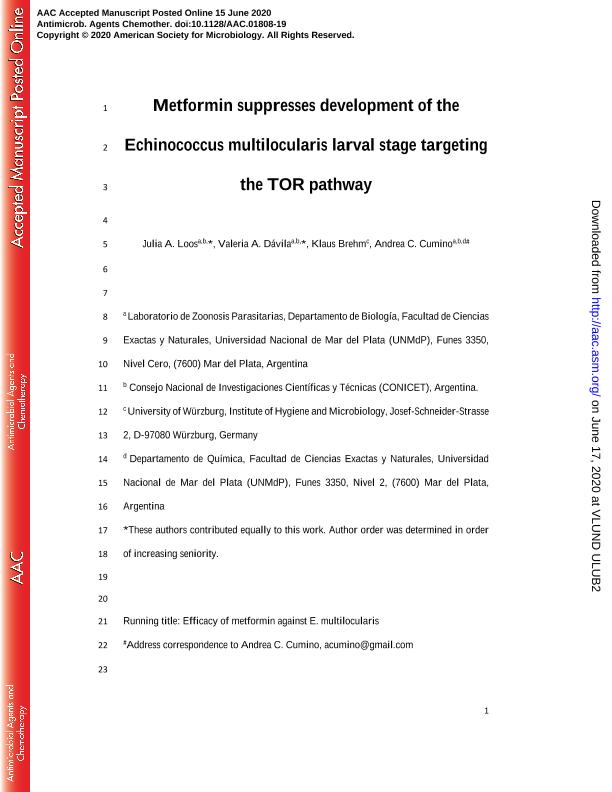Artículo
Metformin suppresses development of the Echinococcus multilocularis larval stage by targeting the TOR pathway
Fecha de publicación:
09/2020
Editorial:
American Society for Microbiology
Revista:
Antimicrobial Agents and Chemotherapy
ISSN:
0066-4804
Idioma:
Inglés
Tipo de recurso:
Artículo publicado
Clasificación temática:
Resumen
Alveolar echinococcosis (AE) is a severe disease caused by the larval stage of the tapeworm Echinococcus multilocularis. Current chemotherapeutic treatment options based on benzimidazoles are of limited effectiveness, which underlines the need to find new antiechinococcosis drugs. Metformin is an antihyperglycemic and antiproliferative agent that shows activity against the related parasite Echinococcus granulosus. Hence, we assessed the in vitro and in vivo effects of the drug on E. multilocularis. Metformin exerted significant dose-dependent killing effects on in vitro cultured parasite stem cells and protoscoleces and significantly reduced the dedifferentiation of protoscoleces into metacestodes. Likewise, oral administration of metformin (50 mg/kg of body weight/day for 8 weeks) was effective in achieving a significant reduction of parasite weight in a secondary murine AE model. Our results revealed mitochondrial membrane depolarization, activation of Em-AMPK, suppression of Em-TOR, and overexpression of Em-Atg8 in the germinal layer of metformin-treated metacestode vesicles. The opposite effects on the level of active Em-TOR in response to exogenous insulin and rapamycin suggest that Em-TOR is part of the parasite’s insulin signaling pathway. Finally, the presence of the key lysosomal pathway components, through which metformin reportedly acts, was confirmed in the parasite by in silico assays. Taken together, these results introduce metformin as a promising candidate for AE treatment. Although our study highlights the importance of those direct mechanisms by which metformin reduces parasite viability, it does not necessarily preclude any additional systemic effects of the drug that might reduce parasite growth in vivo.
Palabras clave:
ALVEOLAR ECHINOCOCCOSIS
,
METFORMIN
,
RAGULATOR
,
TOR
Archivos asociados
Licencia
Identificadores
Colecciones
Articulos(CCT - MAR DEL PLATA)
Articulos de CTRO.CIENTIFICO TECNOL.CONICET - MAR DEL PLATA
Articulos de CTRO.CIENTIFICO TECNOL.CONICET - MAR DEL PLATA
Citación
Loos, Julia Alexandra; Dávila, Valeria Analia; Brehm, Klaus; Cumino, Andrea Carina; Metformin suppresses development of the Echinococcus multilocularis larval stage by targeting the TOR pathway; American Society for Microbiology; Antimicrobial Agents and Chemotherapy; 64; 9; 9-2020; 1-17
Compartir
Altmétricas




